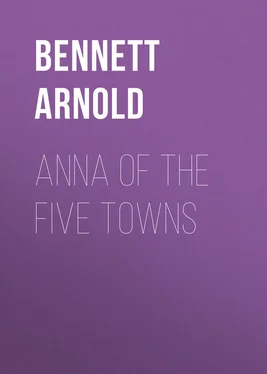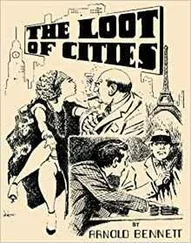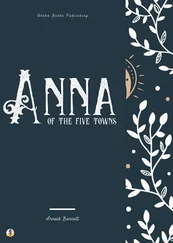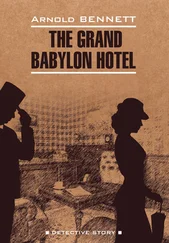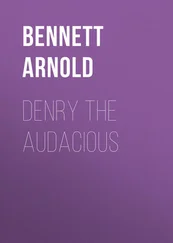Arnold Bennett - Anna of the Five Towns
Здесь есть возможность читать онлайн «Arnold Bennett - Anna of the Five Towns» — ознакомительный отрывок электронной книги совершенно бесплатно, а после прочтения отрывка купить полную версию. В некоторых случаях можно слушать аудио, скачать через торрент в формате fb2 и присутствует краткое содержание. Жанр: foreign_antique, foreign_prose, foreign_language, на английском языке. Описание произведения, (предисловие) а так же отзывы посетителей доступны на портале библиотеки ЛибКат.
- Название:Anna of the Five Towns
- Автор:
- Жанр:
- Год:неизвестен
- ISBN:нет данных
- Рейтинг книги:3 / 5. Голосов: 1
-
Избранное:Добавить в избранное
- Отзывы:
-
Ваша оценка:
- 60
- 1
- 2
- 3
- 4
- 5
Anna of the Five Towns: краткое содержание, описание и аннотация
Предлагаем к чтению аннотацию, описание, краткое содержание или предисловие (зависит от того, что написал сам автор книги «Anna of the Five Towns»). Если вы не нашли необходимую информацию о книге — напишите в комментариях, мы постараемся отыскать её.
Anna of the Five Towns — читать онлайн ознакомительный отрывок
Ниже представлен текст книги, разбитый по страницам. Система сохранения места последней прочитанной страницы, позволяет с удобством читать онлайн бесплатно книгу «Anna of the Five Towns», без необходимости каждый раз заново искать на чём Вы остановились. Поставьте закладку, и сможете в любой момент перейти на страницу, на которой закончили чтение.
Интервал:
Закладка:
Arnold Bennett
Anna of the Five Towns
'Therefore, although it be a history
Homely and rude, I will relate the same
For the delight of a few natural hearts.'
CHAPTER I
THE KINDLING OF LOVE
The yard was all silent and empty under the burning afternoon heat, which had made its asphalt springy like turf, when suddenly the children threw themselves out of the great doors at either end of the Sunday-school – boys from the right, girls from the left – in two howling, impetuous streams, that widened, eddied, intermingled and formed backwaters until the whole quadrangle was full of clamour and movement. Many of the scholars carried prize-books bound in vivid tints, and proudly exhibited these volumes to their companions and to the teachers, who, tall, languid, and condescending, soon began to appear amid the restless throng. Near the left-hand door a little girl of twelve years, dressed in a cream coloured frock, with a wide and heavy straw hat, stood quietly kicking her foal-like legs against the wall. She was one of those who had won a prize, and once or twice she took the treasure from under her arm to glance at its frontispiece with a vague smile of satisfaction. For a time her bright eyes were fixed expectantly on the doorway; then they would wander, and she started to count the windows of the various Connexional buildings which on three sides enclosed the yard – chapel, school, lecture-hall, and chapel-keeper's house. Most of the children had already squeezed through the narrow iron gate into the street beyond, where a steam-car was rumbling and clattering up Duck Bank, attended by its immense shadow. The teachers remained a little behind. Gradually dropping the pedagogic pose, and happy in the virtuous sensation of duty accomplished, they forgot the frets and fatigues of the day, and grew amiably vivacious among themselves. With an instinctive mutual complacency the two sexes mixed again after separation. Greetings and pleasantries were exchanged, and intimate conversations begun; and then, dividing into small familiar groups, the young men and women slowly followed their pupils out of the gate. The chapel-keeper, who always had an injured expression, left the white step of his residence, and, walking with official dignity across the yard, drew down the side-windows of the chapel one after another. As he approached the little solitary girl in his course he gave her a reluctant acid recognition; then he returned to his hearth. Agnes was alone.
'Well, young lady?'
She looked round with a jump, and blushed, smiling and screwing up her little shoulders, when she recognised the two men who were coming towards her from the door of the lecture-hall. The one who had called out was Henry Mynors, morning superintendent of the Sunday-school and conductor of the men's Bible-class held in the lecture-hall on Sunday afternoons. The other was William Price, usually styled Willie Price, secretary of the same Bible-class, and son of Titus Price, the afternoon superintendent.
'I'm sure you don't deserve that prize. Let me see if it isn't too good for you.' Mynors smiled playfully down upon Agnes Tellwright as he idly turned the leaves of the book which she handed to him. 'Now, do you deserve it? Tell me honestly.'
She scrutinised those sparkling and vehement black eyes with the fearless calm of infancy. 'Yes, I do,' she answered in her high, thin voice, having at length decided within herself that Mr. Mynors was joking.
'Then I suppose you must have it,' he admitted, with a fine air of giving way.
As Agnes took the volume from him she thought how perfect a man Mr. Mynors was. His eyes, so kind and sincere, and that mysterious, delicious, inexpressible something which dwelt behind his eyes: these constituted an ideal for her.
Willie Price stood somewhat apart, grinning, and pulling a thin honey-coloured moustache. He was at the uncouth, disjointed age, twenty-one, and nine years younger than Henry Mynors. Despite a continual effort after ease of manner, he was often sheepish and self-conscious, even, as now, when he could discover no reason for such a condition of mind. But Agnes liked him too. His simple, pale blue eyes had a wistfulness which made her feel towards him as she felt towards her doll when she happened to find it lying neglected on the floor.
'Your big sister isn't out of school yet?' Mynors remarked.
Agnes shook her head. 'I've been waiting ever so long,' she said plaintively.
At that moment a grey-haired woman with a benevolent but rather pinched face emerged with much briskness from the girls' door. This was Mrs. Sutton, a distant relative of Mynors' – his mother had been her second cousin. The men raised their hats.
'I've just been down to make sure of some of you slippery folks for the sewing-meeting,' she said, shaking hands with Mynors, and including both him and Willie Price in an embracing maternal smile. She was short-sighted and did not perceive Agnes, who had fallen back.
'Had a good class this afternoon, Henry?' Mrs. Sutton's breathing was short and quick.
'Oh, yes,' he said, 'very good indeed.'
'You're doing a grand work.'
'We had over seventy present,' he added.
'Eh!' she said, 'I make nothing of numbers. Henry. I meant a good class. Doesn't it say – Where two or three are gathered together…? But I must be getting on. The horse will be restless. I've to go up to Hillport before tea. Mrs. Clayton Vernon is ill.'
Scarcely having stopped in her active course, Mrs. Sutton drew the men along with her down the yard, she and Mynors in rapid talk: Willie Price fell a little to the rear, his big hands half-way into his pockets and his eyes diffidently roving. It appeared as though he could not find courage to take a share in the conversation, yet was anxious to convince himself of his right to do so.
Mynors helped Mrs. Sutton into her carriage, which had been drawn up outside the gate of the school yard. Only two families of the Bursley Wesleyan Methodists kept a carriage, the Suttons and the Clayton Vernons. The latter, boasting lineage and a large house in the aristocratic suburb of Hillport, gave to the society monetary aid and a gracious condescension. But though indubitably above the operation of any unwritten sumptuary law, even the Clayton Vernons ventured only in wet weather to bring their carriage to chapel. Yet Mrs. Sutton, who was a plain woman, might with impunity use her equipage on Sundays. This license granted by Connexional opinion was due to the fact that she so obviously regarded her carriage, not as a carriage, but as a contrivance on four wheels for enabling an infirm creature to move rapidly from place to place. When she got into it she had exactly the air of a doctor on his rounds. Mrs. Sutton's bodily frame had long ago proved inadequate to the ceaseless demands of a spirit indefatigably altruistic, and her continuance in activity was a notable illustration of the dominion of mind over matter. Her husband, a potter's valuer and commission agent, made money with facility in that lucrative vocation, and his wife's charities were famous, notwithstanding her attempts to hide them. Neither husband nor wife had allowed riches to put a factitious gloss upon their primal simplicity. They were as they were, save that Mr. Sutton had joined the Five Towns Field Club and acquired some of the habits of an archaeologist. The influence of wealth on manners was to be observed only in their daughter Beatrice, who, while favouring her mother, dressed at considerable expense, and at intervals gave much time to the arts of music and painting. Agnes watched the carriage drive away, and then turned to look up the stairs within the school doorway. She sighed, scowled, and sighed again, murmured something to herself, and finally began to read her book.
Читать дальшеИнтервал:
Закладка:
Похожие книги на «Anna of the Five Towns»
Представляем Вашему вниманию похожие книги на «Anna of the Five Towns» списком для выбора. Мы отобрали схожую по названию и смыслу литературу в надежде предоставить читателям больше вариантов отыскать новые, интересные, ещё непрочитанные произведения.
Обсуждение, отзывы о книге «Anna of the Five Towns» и просто собственные мнения читателей. Оставьте ваши комментарии, напишите, что Вы думаете о произведении, его смысле или главных героях. Укажите что конкретно понравилось, а что нет, и почему Вы так считаете.
